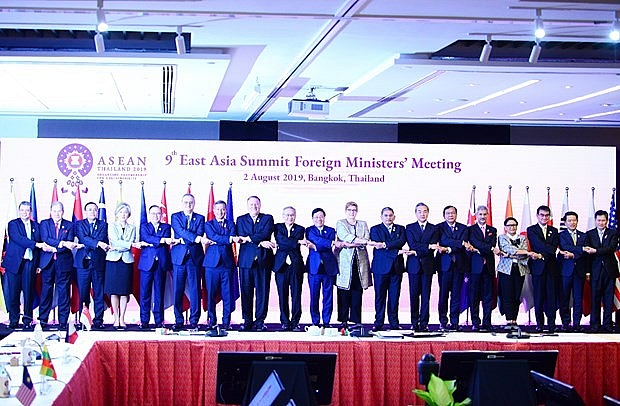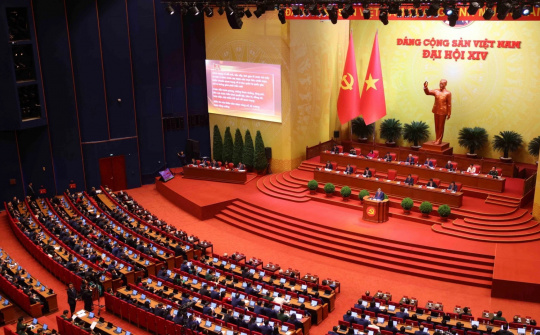VNHN – Foreign Minsters of 18 EAS countries discussed on the East Sea situation in a frank and constructive manner, stressing the importance of maintaining peace, stability, security, and freedom of navigation and overflights in the East Sea during their meeting in Bangkok, Thailand on Friday.

Deputy Prime Minister, Foreign Minister Pham Binh Minh (10th from left) attends the 9th East Asia Summit Foreign Ministers' Meeting in Bangkok, Thailand, on August 2, 2019.
The EAS countries continued affirming the importance of the EAS mechanism since its inception 14 years ago, providing a platform for their leaders to debate on political and economic issues of strategic level.
The EAS is an integral part of an open, inclusive, transparent and rule-based architecture in which ASEAN has played a central role.
The Foreign Ministers underlined the importance of the EAS in enhancing multilateral approach based on the values widely recognized by the international community, which has contributed to fostering peace, stability and prosperity in the region.
On the occasion, the Foreign Ministers agreed to submit three documents, namely Declaration on drug combat, Declaration on combatting transnational crime and Declaration on connectivity, to the 14th East Asia Summit at the end of 2019 for approval.
Regarding regional and international issues, the Foreign Ministers acknowledged recent positive progress on the Korean peninsula, including high-level summits in Singapore and Viet Nam.
The EAS countries voiced support for efforts to resume talks and accelerate diplomatic activities and dialogues to seek long-term solutions to full denuclearization for sustainable peace on the peninsula.
For the East Sea issues, many of the EAS countries expressed grave concerns over the recent developments in the East Sea, including militarization and other activities that have threatened the legitimate economic activities of littoral countries, eroded trust, intensified tensions, and caused negative impacts on peace and stability in the region.
The EAS countries reaffirmed the importance of ensuring peace, stability, security, safety and freedom of navigation and aviation in the East Sea, of non-militarization, of avoiding actions that may complicate the situation, and of settling disputes in line with international law, especially the 1982 United Nations Convention on the Law of the Sea.
The EAS countries also emphasized that all territorial claims must be based on international law, not on coercion.
Addressing the meeting, Deputy Prime Minister, Foreign Minister Pham Binh Minh shared statements on the important role of the EAS, saying the complicated and unpredictable changes require greater role of the mechanism.
Regarding the East Sea issue, Minh shared information on recent unilateral actions that have violated sovereignty and legitimate rights of the littoral countries.
He affirmed that Viet Nam has sufficient historical and legal foundations over the Hoang Sa and Truong Sa archipelagos.
Minh also restated the consistent positions of ASEAN on the East Sea and called for strengthening trust, non-militarization, self-restraint, strict compliance with the international law and the 1982 United Nations Convention on the Law of the Sea, and serious implementation of the Declaration on the Conduct of Parties in the East Sea and conclusion of an effective and efficient Code of Conduct in line with the international law.
The EAS countries comprise 10 ASEAN member States, China, Japan, the Republic of Korea, India, New Zealand, Australia, the US, and Russia./.





